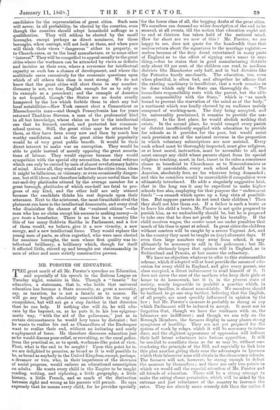employment of force. He therefore discusses education just duce, and
the slightest appearance of oppression will inflame as he would discuss poor-relief, or recruiting, or the rural police, their half latent reluctance into furious opposition. It will from the practical or, so to speak, workman-like point of view, be needful to conciliate them as far as may be, without sur- First, what is the end to be sought ? Upon this point he is, rendering the principle of the Bill, and especially to link into we are delighted to perceive, as broad as it is well possible to this plan another giving their sons the advantages in lyceums be, as broad as anybody in the United Kingdom, except, perhaps, which their labourers' sons will obtain in the elementary schools. a dreamer or two, who, in their impatience of the slowness The farmers will not, however, be strong enough to defeat of social progress, would enforce an educational conscription the measure by themselves ; and there are only two points to on adults. He wants every child in the Empire to be taught which we would call the especial attention of Mr. Forster and
reading, writing, and ciphering, a little geography, a little all friends of education. There will be a strong attempt to history, a little French, and as much of the distinction make the rating clause permissive, which will be aided by the
We have no objection whatever to offer to this statesmanlike scheme, which if adopted will at least provide the means of edu- MR. FORSTER ON EDUCATION, cation for every child in England, and give every parent, one taxes, and this addition will be, in the long run, a severe one. Education, to be efficient, cannot be a matter of farthings in the pound. It is at the same time diffi- cult in the extreme to remedy the absurd but long- standing injustice of a system of rating under which a resident in the country occupying perhaps ten acres, but possessed of 20,000/., pays less rates than the farmer of a hundred acres and one-tenth of that capital. The only easy remedy is, as Mr. Forster suggests, to aid local effort from the taxes, which are more fairly levied, and we doubt, seriously doubt, whether the national proportion of the cost ought not to be heavier than the local. The land is burdened already with the Church and the poor, and we do not want Education to be starved down as the vagrants are. Liberal concessions upon this point will, we are convinced, be indispensable, unless indeed we are prepared to revise the entire rating system, to do for local what we have done for imperial taxation. The other point is the age at which childhood should be considered to end. Thirteen is the age fixed by most of our Factory laws, and it is too young, giving the schoolmasters, in fact, only three years' time for any work beyond the A B C. Every year after this age is worth two years before it, and it will be well if possible to extend it at least for boys to fifteen. It must be remembered that under the half-time system the great objec- tion to late attendance at school, the necessity of accustoming lads to labour, disappears, and the school period may, as far as that is concerned, safely be protracted. There will be a bitter fight over this point, and we want reformers to remem- ber that every month gained is of value to the future. All cannot be obtained that theorists desire, but the cause has made immense progress during the year, and under Mr. Forster's moderate and judicious scheme every English child may, we frankly acknowledge, be provided with a fair measure of elementary instruction. For more, we must, we fear, wait until one generation has gone to school.































 Previous page
Previous page